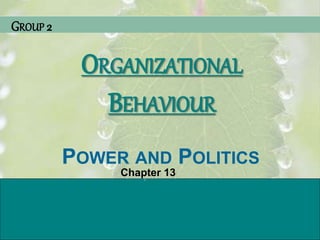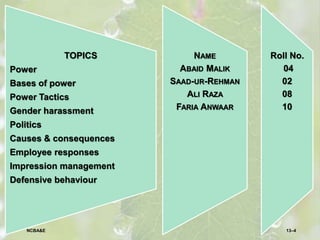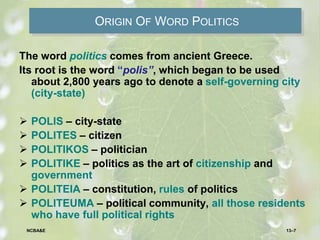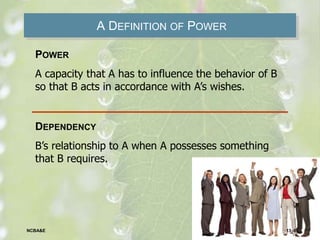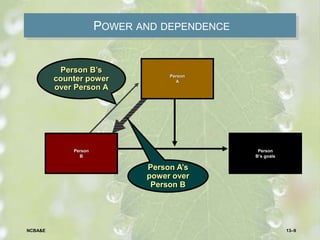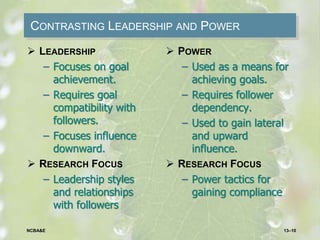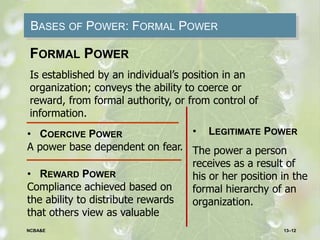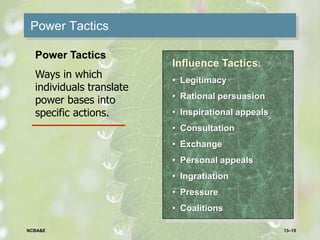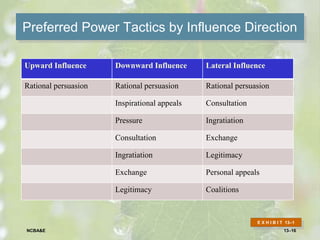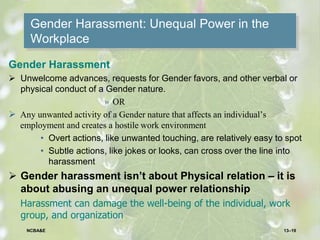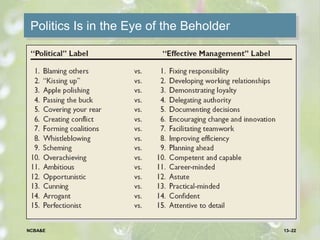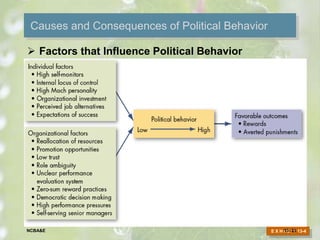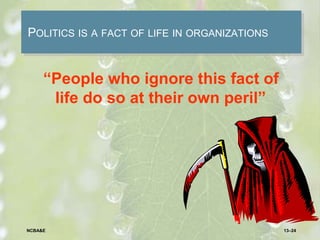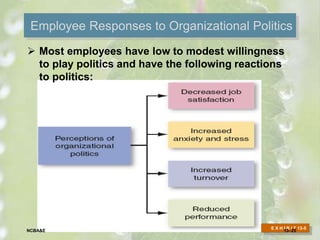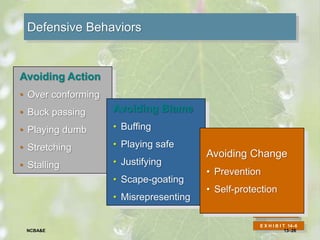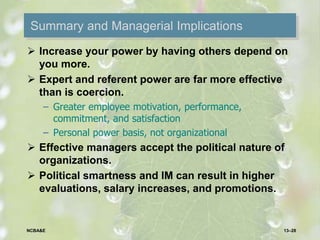Power & politics
- 2. National College OF business administration & economics WCC GUIDED BY: PROF. TAFZIL HUSSAIN PRESENTED BY : ABAID MALIK SAAD-UR-REHMAN ALI RAZA FARIA ANWAAR
- 3. ORGANIZATIONAL BEHAVIOR S T E P H E N P. R O B B I N S E L E V E N T H E D I T I O N W W W . P R E N H A L L . C O M / R O B B I N S© 2005 Prentice Hall Inc. All rights reserved. PowerPoint Presentation by Charlie Cook POWER AND POLITICS Chapter 13 ORGANIZATIONAL BEHAVIOUR GROUP 2
- 4. TOPICS Power Bases of power Power Tactics Gender harassment Politics Causes & consequences Employee responses Impression management Defensive behaviour Roll No. 04 02 08 10 NAME ABAID MALIK SAAD-UR-REHMAN ALI RAZA FARIA ANWAAR 13–4NCBA&E
- 5. ORGANIZATIONAL BEHAVIOR S T E P H E N P. R O B B I N S E L E V E N T H E D I T I O N W W W . P R E N H A L L . C O M / R O B B I N S© 2005 Prentice Hall Inc. All rights reserved. PowerPoint Presentation by Charlie Cook “POWER TENDS TO CORRUPT; ABSOLUTE POWER CORRUPTS ABSOLUTELY”
- 6. CHAPTER LEARNING OBJECTIVES 1. Origin of word politics 2. Define Power & Dependency 3. Contrasting leadership & Power 4. Describe the five bases of power in organisations. 5. Dependency: The Key To Power 6. Power Tactics. 7. Preferred Power Tactics by Influence Direction 8. Discuss the role of power in Gender harassment. 9. Politics: Power In Action 10.Politics in eye of beholder. 11.Causes & consequences of political behaviour. 12.Employee responses to organizational politics 13.Impression management (IM) & its techniques 14.Defensive behaviour 13–6NCBA&E
- 7. ORIGIN OF WORD POLITICS The word politics comes from ancient Greece. Its root is the word “polis”, which began to be used about 2,800 years ago to denote a self-governing city (city-state) POLIS – city-state POLITES – citizen POLITIKOS – politician POLITIKE – politics as the art of citizenship and government POLITEIA – constitution, rules of politics POLITEUMA – political community, all those residents who have full political rights 13–7NCBA&E
- 8. A DEFINITION OF POWER POWER A capacity that A has to influence the behavior of B so that B acts in accordance with A’s wishes. DEPENDENCY B’s relationship to A when A possesses something that B requires. 13–8NCBA&E
- 9. POWER AND DEPENDENCE Person A Person B’s goals Person B Person B’s counter power over Person A Person A’s power over Person B 13–9NCBA&E
- 10. CONTRASTING LEADERSHIP AND POWER LEADERSHIP – Focuses on goal achievement. – Requires goal compatibility with followers. – Focuses influence downward. RESEARCH FOCUS – Leadership styles and relationships with followers POWER – Used as a means for achieving goals. – Requires follower dependency. – Used to gain lateral and upward influence. RESEARCH FOCUS – Power tactics for gaining compliance 13–10NCBA&E
- 11. Bases of Power FORMAL POWER Coercive Reward Legitimate PERSONAL POWER Expert Referent BASES OF POWER 11NCBA&E
- 12. BASES OF POWER: FORMAL POWER • COERCIVE POWER A power base dependent on fear. • REWARD POWER Compliance achieved based on the ability to distribute rewards that others view as valuable FORMAL POWER Is established by an individual’s position in an organization; conveys the ability to coerce or reward, from formal authority, or from control of information. • LEGITIMATE POWER The power a person receives as a result of his or her position in the formal hierarchy of an organization. 13–12NCBA&E
- 13. Bases of Power: Personal Power Expert Power Influence based on special skills or knowledge. Referent Power Influence based on possession by an individual of desirable resources or personal traits. Power that comes from an individual’s unique characteristics – these are the most effective 13–13NCBA&E
- 14. Dependency: The Key To Power The General Dependency Postulate – The greater B’s dependency on A, the greater the power A has over B. – Possession/control of scarce organizational resources that others need makes a manager powerful. – Access to optional resources (e.g., multiple suppliers) reduces the resource holder’s power. What Creates Dependency – Importance of the resource to the organization – Scarcity of the resource – Non-substitutability of the resource 13–14NCBA&E
- 15. Power Tactics Influence Tactics: • Legitimacy • Rational persuasion • Inspirational appeals • Consultation • Exchange • Personal appeals • Ingratiation • Pressure • Coalitions Power Tactics Ways in which individuals translate power bases into specific actions. 13–15NCBA&E
- 16. Preferred Power Tactics by Influence Direction E X H I B I T 13–1 Upward Influence Downward Influence Lateral Influence Rational persuasion Rational persuasion Rational persuasion Inspirational appeals Consultation Pressure Ingratiation Consultation Exchange Ingratiation Legitimacy Exchange Personal appeals Legitimacy Coalitions 13–16NCBA&E
- 17. Factors Influencing the Choice and Effectiveness of Power Tactics Sequencing of tactics – Softer to harder tactics works best. Skillful use of a tactic – Experienced users are more successful. Relative power of the tactic user – Some tactics work better when applied downward. The type of request attaching to the tactic – Is the request legitimate? How the request is perceived – Is the request accepted as ethical? The culture of the organization – Culture affects user’s choice of tactic Country-specific cultural factors – Local values favor certain tactics over others. 13–17NCBA&E
- 18. Power Tactics: From Most to Least Popular 13–18NCBA&E
- 19. Gender Harassment: Unequal Power in the Workplace Gender Harassment Unwelcome advances, requests for Gender favors, and other verbal or physical conduct of a Gender nature. » OR Any unwanted activity of a Gender nature that affects an individual’s employment and creates a hostile work environment • Overt actions, like unwanted touching, are relatively easy to spot • Subtle actions, like jokes or looks, can cross over the line into harassment Gender harassment isn’t about Physical relation – it is about abusing an unequal power relationship Harassment can damage the well-being of the individual, work group, and organization 13–19NCBA&E
- 20. Steps for Managers to Take to Prevent Gender Harassment Make sure a policy against it is in place. Ensure that employees will not encounter retaliation if they file a complaint. Investigate every complaint and include the human resource and legal departments. Make sure offenders are disciplined or terminated. Set up in-house seminars and training. 13–20NCBA&E
- 21. Politics: Power in Action Political Behavior Activities that are not required as part of one’s formal role in the organization, but that influence, or attempt to influence, the distribution of advantages or disadvantages within the organization. Legitimate Political Behavior Normal everyday politics. Illegitimate Political Behavior Extreme political behavior that violates the implied rules of the game. 13–21NCBA&E
- 22. Politics Is in the Eye of the Beholder 13–22NCBA&E
- 23. Causes and Consequences of Political Behavior Factors that Influence Political Behavior E X H I B I T 13-413–23NCBA&E
- 24. POLITICS IS A FACT OF LIFE IN ORGANIZATIONS “People who ignore this fact of life do so at their own peril” 13–24NCBA&E
- 25. Employee Responses to Organizational Politics Most employees have low to modest willingness to play politics and have the following reactions to politics: E X H I B I T 13-5 13–25NCBA&E
- 26. Defensive Behaviors E X H I B I T 13-6 Defensive Behaviors Avoiding Action • Over conforming • Buck passing • Playing dumb • Stretching • Stalling Avoiding Blame • Buffing • Playing safe • Justifying • Scape-goating • Misrepresenting Avoiding Change • Prevention • Self-protection E X H I B I T 14–6 13–26NCBA&E
- 27. Impression Management (IM) The process by which individuals attempt to control the impression others form of them IM Techniques – Conformity – Favors – Excuses – Apologies – Self-Promotion – Enhancement – Flattery – Exemplification E X H I B I T 13-7 13–27NCBA&E
- 28. Summary and Managerial Implications Increase your power by having others depend on you more. Expert and referent power are far more effective than is coercion. – Greater employee motivation, performance, commitment, and satisfaction – Personal power basis, not organizational Effective managers accept the political nature of organizations. Political smartness and IM can result in higher evaluations, salary increases, and promotions. 13–28NCBA&E
- 29. 13–29NCBA&E


